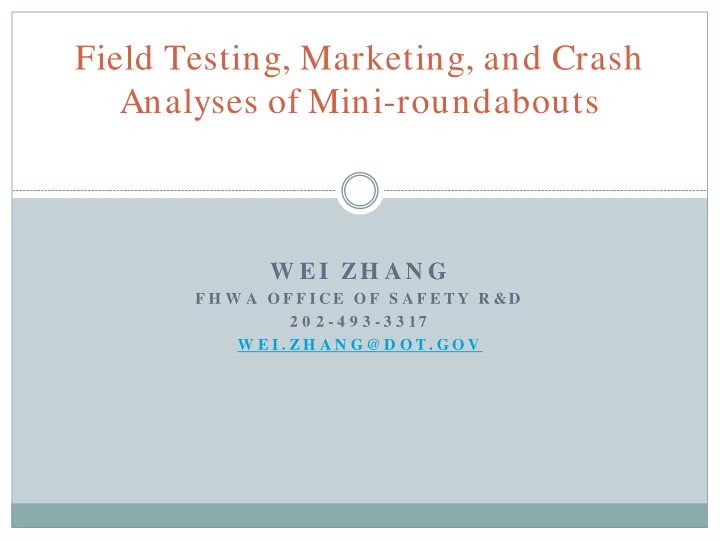

Field Testing, Marketing, and Crash Analyses of Mini-roundabouts W E I ZH AN G F H W A O F F I C E O F S A F E T Y R &D 2 0 2 - 4 9 3 - 3 3 17 W E I . Z H A N G @ D O T . G O V
FHWA Safety R&D Intersection Program Field evaluation of innovative design concepts Fundamental and Exploratory Research Development and Support of Analysis Tool
Field Evaluation Projects Displaced Left Turn Intersections (2 sites in UT, LA) Double Crossover Diamond Interchanges (8 sites in MO, NY, TN, KY) Restricted Crossing U-Turn Intersections (9 sites in MD) Intersection Speed Reduction By Lane Narrowing (10 sites in PA, OH, MO, MD) Detection-Control System (8 sites in FL, IL, LA, TX) Mini-roundabout (GA, MD, NY)* *: Recruiting up to 10 sites for evaluation
Products Developed Roundabout Informational Guide Signalized Intersections Informational Guide Alternative Intersections Informational Guide Field Evaluation Reports on DLF RCUT D-CS
Fundamental and Exploratory Researches Safety impacts of access mgmt policies and design techniques In-vehicle pedestrian detection using stereo vision technology Eye tracking study to detect driver visual distraction other abnormal events
Software Tools Developed Surrogate Safety Assessment Model (SAAM) Interchange Safety Assessment Tool (ISAT) Alternative Intersection Selection Tool (AIST)
Mini-Roundabout, what is it? A single-lane roundabout with inscribed diameter in the range of 50 to 80 ft Defining feature is a traversable central island (and split islands) to handle large vehicles Advantages include: Higher capacity than stop control Fit into existing intersection ROW Improve intersection operating efficiency and safety Low cost ($25,000 to $50,000 per intersection)
Design Objectives of the Mini Central Island Traversable by large vehicles Un-comfortable for small vehicles Not causing problems for winter maintenance
Suitable Locations for Mini-roundabout Intersections on 2-lane or 3-lane high volume collector roads Post speed 35 mph or less Low truck volume Comparable traffic volume from major and minor approaches
Recommended Signing and Pavement Markings
Partnership Responsibilities FHWA Provides free technical supports (design templates, capacity analysis, review of geometric and signing designs) Conducts before/ after operational & safety evaluations Tailors evaluation to individual site’s improvement objectives whenever possible Participating Agencies Identify suitable sites (intersections on 2 or 3 lane roads) Cover costs of engineering design and construction Provide available traffic counts and crash data
Examples of Constructed Minis
Mini-roundabout, France
Mini-roundabout in England
Mini-roundabout in Australia
To Be Constructed, Atlanta, GA
Newly constructed in Takoma Park, MD
Best to use raised but traversable islands
Surface Material of central Island Stamped epoxy or concrete
Use edges that are raised
Temporary Traffic Circle in Phoenix, AZ
The Following Examples are NOT mini-roundabouts P A Y A T T E N T I O N T O T H E U S E F U L I D E A S T H A T C A N B E U S E D W H E N D E S I G N I N G M I N I - R O U N D A B O U T S
Small size 1-lane roundabout, FL
Small Roundabout in Phoenix, AZ
Quasi Mini Grant Ln & Trailside Dr, Columbia, MO Grant Ln is a high volume collector road with post speed of 35 mph
Traversable Central Island Grant Ln & Trailside DR, Columbia, Mo
Split Island, Grant Ln & Trailside DR, Columbia, Mo
Takoma Park, MD Large vehicle getting around mini-roundabout Driving around a mini-roundabout Traversing a mini-roundabout Multiple cars entering a mini-roundabout
Stevensville, MD
Basic Characteristics Traffic volume = 600 vph (595 vph collected): Leg 1: 160 vph, Leg 2: 240 vph, Leg 3: 200 vph. Traffic movement: Left-turn (67%), Right-turn (33%) Traffic composition: Car (46%), SUV/ pickup (51%), and Truck (3%) Average Travel time through the roundabout Right-turn: 2-3 sec Left-turn: 5-7 sec (car/ SUV), 10 sec (truck) Stopping Behavior Completely Stop (15%), Rollover and No-Stop (85%)
Stevensville MD Large vehicle exiting expressway Camper Long truck and boat Long truck making right and left turns Motorcycle and trucks etc Simultaneous entries Small truck and driver confusion SUV with tow-car Vehicle stream
Contact Information Mini Roundabouts Evaluation Wei Zhang (FHWA Safety R&D) (202) 493-3317, wei.zhang@dot.gov Joe Bared (FHWA Ops R&D) (202) 493-3314, Joe.bared@dot.gov Hillary Isebrands (FHWA Resource Center) (720) 963-3222, hillary.isebrands.dot.gov Ramanujan Jagannathan (VHB) (703) 847.3071 x5240, ram@vhb.com
Questions? D - CS
Lake Stevens, WA (2016)
Recommend
More recommend